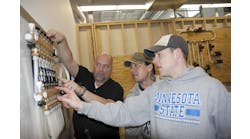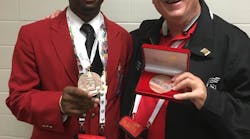Latest from Contractor University
Sponsored
Three 19-year-old plumbing apprentices sat in the front of the room during a recent customer service seminar. They were mostly attentive and engaging.
Midway through the seminar, the apprentice nearest me, sitting in the aisle seat, got preoccupied with his smartphone and this piqued my interest.
“What are you doing there?” I asked.
His surprised grin told me everything I needed to know. He was busted.
“Give me your smartphone,” I said jokingly.
He handed me his device and, within a split second, a text message appeared on the screen from the person with whom he was texting. That person just happened to be his girlfriend and the message is not for public consumption. I promptly show him the message and his face turned beet red.
My serious facial expression conveyed my disappointment and, after handing the device back to him, he promptly turned it off and put it away.
Does this millennial scenario sound familiar?
Anecdotes like this abound among our younger workforce and what is often required is a stable mentor to guide millennials onto the correct path.
Thankfully, I am privileged to meet hundreds of millennial apprentices from coast to coast. Teaching soft skills to the younger workforce is a passion and, every now and then, I meet an apprentice who clearly rises above the fray.
I believe there are more millennials, just like Deshia Peters, who seek the guidance and wisdom of a patient mentor.
Scores of trade school instructors have become close friends of mine during the last few years of traveling across the USA in my pickup. Seeing our beautiful country up close and personal allows me to invest more time with people. And it was during a recent trek that I learned how one trade school student benefited from soft skills training. The student’s name is Deshia Peters from Tulsa Oklahoma.
When Deshia Peters got into his customer service groove, it was so good that it won him first place in a state SkillsUSA championship.
Pat Enoch and Jimmy Hawley are instructors at Tulsa Tech, in Tulsa, Oklahoma, and they utilize my HVAC Customer Service Handbook in their soft skills curriculum.
Peters, a student at Tulsa Tech had done so well in the customer service portion of his class that instructors Enoch and Hawley, enrolled him in the SkillsUSA state championships, Customer Service Division.
SkillsUSA partners with students teachers and industry to promote a technical education with programs events and competition. The Customer Service Division competition is recent and due to all the emphasis placed on workforce development and soft skills as key career factors.
Peters’ first place state champion title, won him automatic entry into the national competition, where he finished third.
After graduating last June, Peters found a well-paying job with Airco Service in Tulsa. I believe there are more millennials, just like Deshia Peters, who seek the guidance and wisdom of a patient mentor.
I spoke with Deshia Peters over the phone and his humble and professional demeanor serves him well.
“I thought the competition was great because it allowed me to compete against the best in the country,” said Peters. “I’m grateful to my teachers, Mr. Enoch and Mr. Hawley, who motivated me to learn and compete. The HVAC Customer Service Handbook gave me confidence and taught me to pause before answering a customer’s question. Listening is important. Customers are more cooperative when they feel understood.”
I was delighted to hear Deshia Peters mention the importance of “the pause” during customer interactions. This singular communication skill helps professionals to not say what they may soon regret. The practice of restraint is a powerful skill when applied during vital relationships among coworkers and customers.
Today’s workforce shortage among skills trade workers isn’t going to be resolved overnight. It will take patience, caring and time. Among the three aforementioned attributes, I’d say time is the most valuable.
Steve Coscia | President
Steve Coscia is one of the most widely published and quoted authorities in trade publications on the topics of customer service and soft skills. An avid researcher of customer service trends, Coscia conducted one of the industry’s first studies of stress in the customer service environment. His Soft Skills Curriculum is taught worldwide at colleges and career centers. Trade Associations such as ACCA, PHCC, SMACNA, AMCO and NPGA host Coscia’s speeches and seminars as a benefit to their members.


